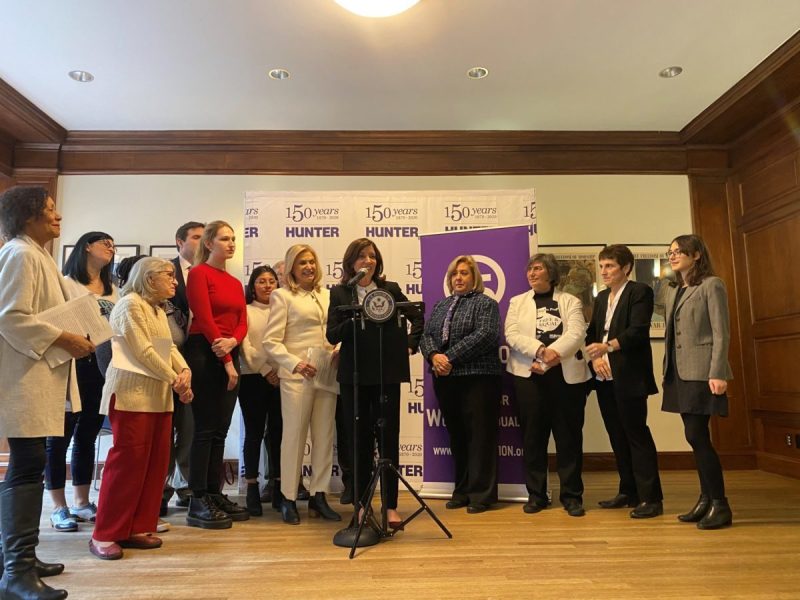
On Thursday, April 25th, Congresswoman Carolyn B. Maloney (NY-12) (pictured center) joined elected officials and Equal Rights Amendment advocates to condemn a recent US Department of Justice decision to not defend a federal law banning FGM/C, to call for Speaker Pelosi to step in to defend the law, and call for the ratification of the Equal Rights Amendment (ERA). Congresswoman Maloney is the sponsor of H.J. Res. 35, a bill to restart the ratification process of the ERA.
While the Trump Administration has decided not to defend the 1996 law banning FGM/C, the House or the Senate could do so. Accordingly, Congresswoman Maloney wrote a letter today (partial text below) to Speaker Nancy Pelosi to urge her to defend the law in the U.S. Court of Appeals.
In light of a federal district court in Michigan’s November, 2018 ruling that Congress does not have the constitutional authority to criminalize FGM/C, the advocates today highlighted the need to ratify the ERA. Without this constitutional bedrock protecting women’s rights, courts can roll back the laws Congress passes.
“As a survivor of female genital mutilation, I am deeply disappointed by the decision of the Department of Justice,” added Aissata M.B. Camara, Co-Founder, There Is No Limit Foundation. “This outcome undermines decades of progress made by activists like me to end this harmful practice. It sends a negative message about the value of our bodies and experiences. The time to act is now—protecting women and girls rights must be a priority. I applaud everyone breaking their silence because FGM affects all of us and it’s a violation of human rights. Ending this practice requires collective action rooted in community education and strong policies. I know we can achieve a world without FGM so women and girls can live to their full potential”
According to Kate Kelly, Program Officer of Women’s and Girl’s Rights at Equality Now, “Simply put, FGM is a human rights violation. It’s a form of gender-based violence and child abuse. The procedure can be fatal, and is always harmful. The decision by the DOJ to not appeal the decision in the Nagarwala case tacitly says that the federal government can’t pass laws to stop human rights violations. This is not true. Congress does have the authority to enact an FGM law. In fact, it is under international obligation to do so. Currently, 19 states do not have laws against FGM. In this very case girls were taken across state lines to be cut. This alarming lack of federal enforcement and gap in state laws is putting American women and girls at risk today.”
Background
- In 1996, Congress criminalized the practice of female genital mutilation (18 USC §116), which is recognized internationally as a violation of the human rights of women and girls.
- The World Health Organization states that the procedure has no health benefits for girls and women and can cause severe bleeding and problems urinating, and later cysts, infections, as well as complications in childbirth and increased risk of newborn deaths.
- In the first federal case (U.S. v. Nagarwala) brought under the FGM/C law, a Michigan federal district court judge overturned the law on the grounds that Congress lacked the authority to legislate in this area. The judge rejected the idea that either the Commerce Clause or international treaties were sufficient to provide Congress jurisdiction. Last Friday, the U.S. Department of Justice announced that it would not defend the law.
- 5 of the 9 victims in the case had been transported across state lines to undergo FGM/C.
- More than 500,000 women and girls in the United States have undergone or are at risk of undergoing female genital mutilation according to the Center for Disease Control and Prevention.
- More than 100,000 women and girls who live in the 19 states that lack laws banning FGM/C are at risk without the federal FGM law.
- Just 15 states ban transporting a person across state lines for the purpose of undergoing FGM/C
- Chairman Jerry Nadler announced this week that the House Judiciary Committee will hold the first Congressional hearing on the Equal Rights Amendment in more than three decades on April 30, moving us closer to ratification.


